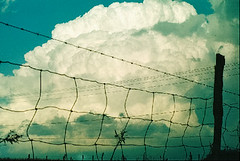The Changing Sphere of Journalism
The following is the rough draft of a feature article that may or may not be sequeled in the future. It was originally going to be a part of a zine that has turned out to be more speculative than real.
I normally don't publish rough drafts, but I wanted to float this on my page for a couple of reasons. Feel free to add your two cents; as long as its your own two cents, it is welcome. That's why I'm here.
Journalism and imprisonment need no more introduction than rice and beans, but lately the relationship between journalists and their captors has put sand on the fires of democracy and given the definition of limited freedom of speech a stretch, particularly outside of the formally recognized coverlet of the press. Media convergence has taken on greater scope and new meaning worldwide, and a couple of factions have arisen to rally the efforts of those engaged in the field officially and those working under their own auspices. The goal is clear: freedom of the press should be unrestricted and universal.
One group inspired by a source more contemporary than the Bill of Rights is the Paris-based Reporters Without Borders, founded by its current Secretary General Robert Menard as a non-governmental organization (NGO) and built upon the principles of free information and expression outlined in the 1948 Universal Declaration of Human Rights. As an international media watchdog, the NGO assumes several responsibilities that have ranged from campaigning to free 27 journalists in Castro's Cuba in 2003 to compiling a "worldwide press freedom index" that ranks 168 countries based upon surveys sent out to many sectors of the global media community.
According to the October 2006 index publication, 52 countries reported less press restraints than the U.S., with countries like Finland, Ireland, the Czech Republic and Switzerland scaling the top 8 while Russia, Singapore, Iran and Korea sank to the bottom 25. China's ranking at 163 places an especial perspective on the ongoing censorship laws that its citizens face. Shanghai blogger Isaac Mao and others like him have written open letters to businesses in the position to help loosen the flow of information, one notable example asking Google founders Sergey Brin and Larry Page to stop imposing filters that restrict search options, denying the Chinese government the censorship power. Pleas like this have also traditionally been backed up and reiterated by Reporters Without Borders.
After admitting in 2005 that a small percentage of its funding came contractually from the Center for a Free Cuba in Washington, though, the NGO's tactics and public statements have elicited magnified scrutiny from questioners of the group's motives who descry a furtherance of U.S. and other Western interests. One such critic has been studying Cuba and the Latin world extensively and published web-accessible articles all over calling out the NGO for its dismissive treatment of existing news organizations and outlets where and when the government is perceived to be a threat to press freedom.
Sorbonne University researcher Salim Lamrani, publishing mainly among counter watchdog groups like his home-based Voltairnet.org – self-promoted as part of the "non-aligned press network" – and Seattle-based Reclaim the Media.org, specifically criticized the NGO's ostensible purpose of aiding independence in journalism as self-contradictory and claimed that it has become "a transmission cable for the State Department." In addition to his suggestion that Reporters Without Borders may be helping the U.S. government plot an overthrow of Hugo Chavez in Venezuela (knowingly or not), he pointed out that, "In Cuba, 156 foreign correspondents of 126 press agencies of 37 countries have an accreditation that allows them to do their job. These professionals have all material and relational services to perform their duties completely guaranteed."
What Lamrani refers to, of course, is money and a network. Reporters Without Borders sent out surveys to those corners of the world where money, press networks and accreditation already existed to create its index. What the index doesn't show as a result are the millions operating as the proponents of the NGO's self-proclaimed mantra, Article 19. "Everyone has the right to freedom of opinion and expression; this right includes freedom to hold opinions without interference," the article states, "and to seek, receive and impart information and ideas through any media and regardless of frontiers."
Despite the debatable impetus behind Robert Menard and his outfit, the September 2005 publication of the Handbook for Bloggers and Cyber-Dissidents offered a tone and approach to independent journalism contrary to the NGO's opponents' sticking points. The online guide provides technological advice for setting up a web log and making it as salient and interactive as possible, while attempting to promote and cultivate a new kind of journalism. "Not all bloggers do journalism," notes former columnist Don Gilmor in the Handbook's introduction. "Most do not. But when they do, they should try to be ethical." Not only has the internet opened doors for freelance journalists to have audiences beyond what media outlets willing to pick them up have to offer, it has now given them basic acknowledgment of Article 19 rights and unlimited potential vis-à-vis guidelines such as these.
The Handbook has also helped to shape a new breed of political activism, tossing encouraging tips to those seeking to further or continue their causes online anonymously if they so choose, without fear of any retaliation or censorship from their government. One such dissident is Martyn See, guilty of having filmed a documentary in Singapore, a country noted for its very limited press freedom that likewise includes very stringent laws for film. A response to a public perception of Singapore as a market place without any notable political history, Singapore Rebel featured an interview with the National University of Singapore's Dr. Chee Soon Juan, stock footage of his attempt at a May Day rally and his subsequent arrest. The documentary cost See 15 months of police harassment and the seizure of his film, both of which constitute legal actions under the country's revised 1998 Film Act. See is just one of many political malcontents who continue to document their struggles online, but the virtual revolution only twirls so far.
Even in the U.S., Reporters Without Borders can appeal the lengthy imprisonment of bloggers held for reasons lying outside of national security concerns, but beyond that and some buried criticism the NGO can effect no real change. In July of 2001, freelance journalist Vanessa Leggett was arrested for refusing to give up a source name for a book she was writing about the murder of a Texan millionaire. She was held until January 2002. Prior to that, the only record of a journalist being held in contempt longer than one day was during the Charles Manson scare, when Los Angeles Herald Examiner writer William Farr was jailed for 46 days for not revealing the source of the hairy trial's leaks.
Since then accredited New York Times journalist Judith Miller was held for three and a half months for what was more a case of international administrative embarrassment than national security, but she and Farr and even Leggett were recently surpassed by American blogger and freelance journalist Josh Wolf, whose stay in the Dublin, California federal prison tallied up to over 200 days early this month. Wolf's crime? Refusing to surrender video files of a 2005 riot he observed at a G8 Summit protest in San Francisco, during which a police car was the alleged victim of arson. The police 's reason for the significance of the video files has changed numerous times, however, according to both the 24-year-old prisoner and his worried mother. "When Judith Miller was in jail for 85 days, it was in the paper almost every day. Journalist in jail! Journalist in jail! And my son has been in jail almost twice that long and it's gotten almost no coverage."
Liz Wolf-Spada's feelings concerning her son's unique situation were more sensitive to the media's treatment of him than police procedure. "And, to me, that's a total injustice, that because he's a video blogger in San Francisco who's not connected with corporate media his case is not getting the kind of attention that the Balco case is getting, and those two reporters aren't even in jail."
Despite the apparent push for coverage from various web-based media sources, accredited and otherwise, The Wolf case facts remain only slightly more traceable than dew. His story and the future of internet journalism await this July's expiration of the grand jury's investigation; beyond that, he could be held until a cumulative sentence of 18 months, the maximum allowed for contempt of court. In the intervening time, the sharp contrast between Judith Miller's now-household name and Wolf and Leggett's obscurity speaks for itself, as does the fact that despite its Handbook and its appeals, Reporters Without Borders will probably not be sending Josh Wolf a survey when it prepares to recalibrate its worldwide press freedom index.
Update: since this article posted, Wolf has been released from custody, an event that made the local, evening news.
Labels: Journalism, Politics














1 Comments:
Thanks, Liz...audio interviews are like that. I had actually tried to reach you to figure out what you were referring to, but the web is still such an imperfect tool for real contact.
And here, I thought research would suffice : D
But seriously, this is exactly the kind of comment I was looking for...appreciated.
And chin up.
Post a Comment
<< Home